In this Article
Toggle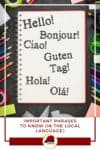


Although English is widely spoken around the world, knowing a few basic phrases in the local language when you travel will enhance your experience. Here are ten common phrases to know in the local language when you travel abroad.
I’ve read that the ideal time to learn a second language is between the ages of three and seven. Lucky for me, my family lived in Germany when I was that age, and my parents seized every opportunity to travel throughout Europe during those years. Plus also, my mother is a teacher.
While I didn’t formally study a European language at my American school, I was regularly exposed to German, French, Dutch, and other European languages as we camped our way through Bavaria, explored France, and ate our way through the Netherlands. I also had the chance to watch Sesamstraße (Sesame Street in German) and expand my budding reading skills by being exposed to signs, menus, and more in multiple languages. I loved soaking up these languages, especially at night when I hauled my favorite book to bed.
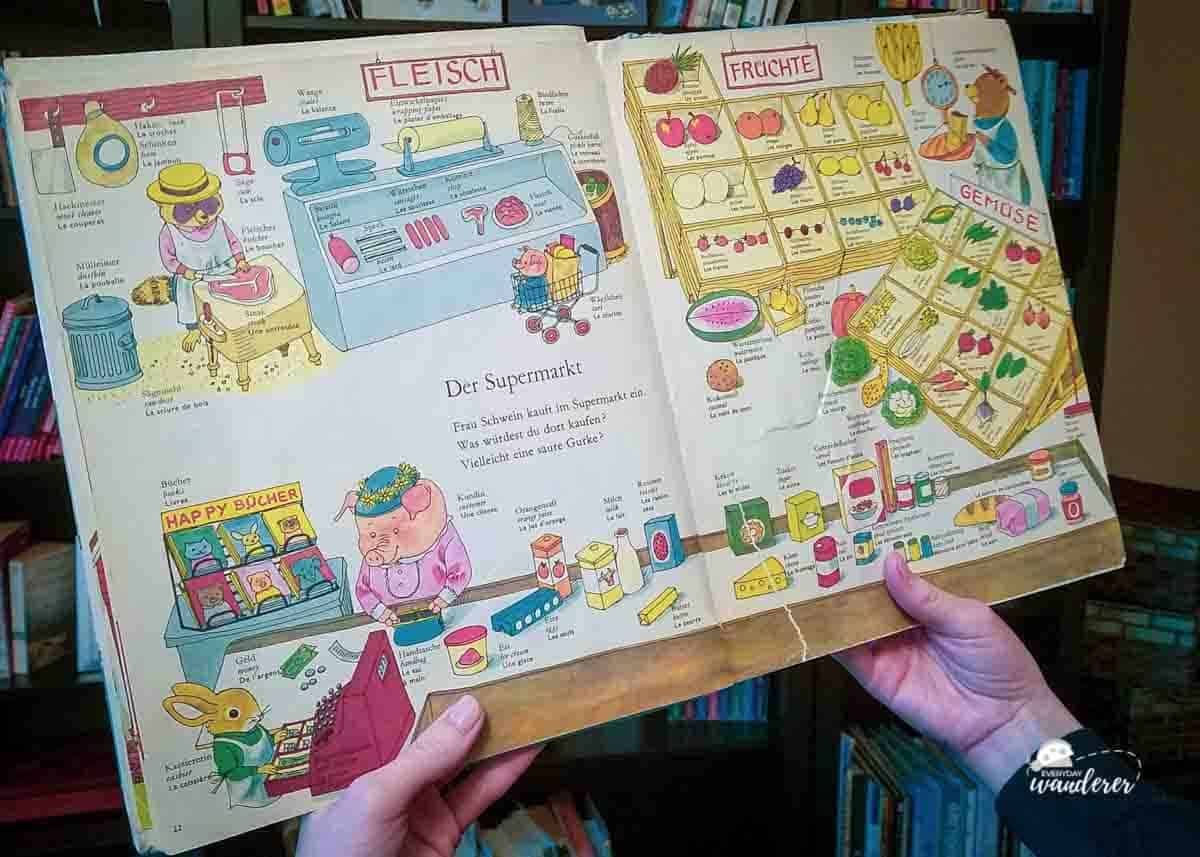
Incorporated into his elaborate, themed scenes are words and phrases in German, English, and French. By pouring over the pages each night, I was able to teach myself quite an assortment of words and phrases in three of the most commonly spoken languages in Western Europe.
Had my family remained in the US, I would have likely not been exposed to a foreign language until high school. Sure, there would have been the snippets of dialect heard when visiting my grandparents in the tight-knit, German Catholic community where my parents were raised. But nothing much beyond that.
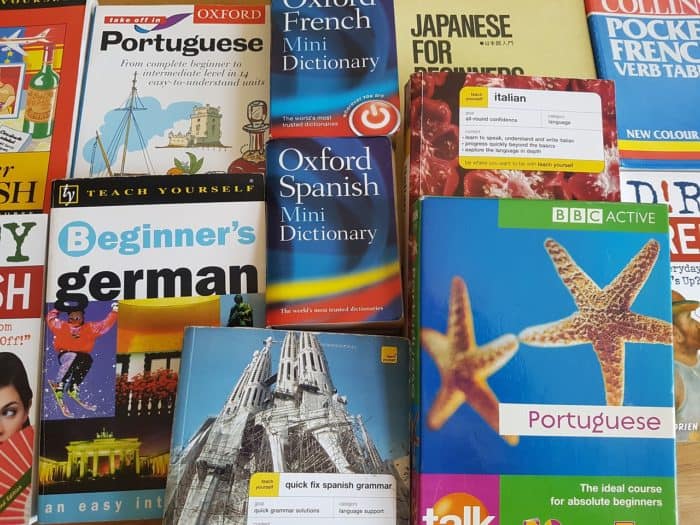
With the establishment of the European Union in 1993, English has only become even more commonly spoken across Europe over the past few decades since I lived there as a child. While this makes it easier than ever before for Americans traveling the continent to communicate with others, there are tremendous benefits to knowing even just a few words and key phrases in the local language. Not only will knowing these phrases in the local language expand your skills, it will also enrich your travel experiences and help you earn the respect of the locals.
Sage Advice: The longer you plan to spend in a country, the more phrases you should know in the local language.
While you’re likely older than seven, and therefore outside the ideal window for learning a foreign language, you can still do it! And you’ll find that knowing even a few essential phrases in the local language will profoundly enrichen your travel experiences.
To help offset the costs of running EverydayWanderer.com, you’ll find affiliate links lightly sprinkled throughout the site. If you choose to make a purchase via one of these links, there’s no additional cost to you, but I’ll earn a teeny tiny commission. You can read all of the legal blah blah blah (as my little niece says) on the full disclosure page.
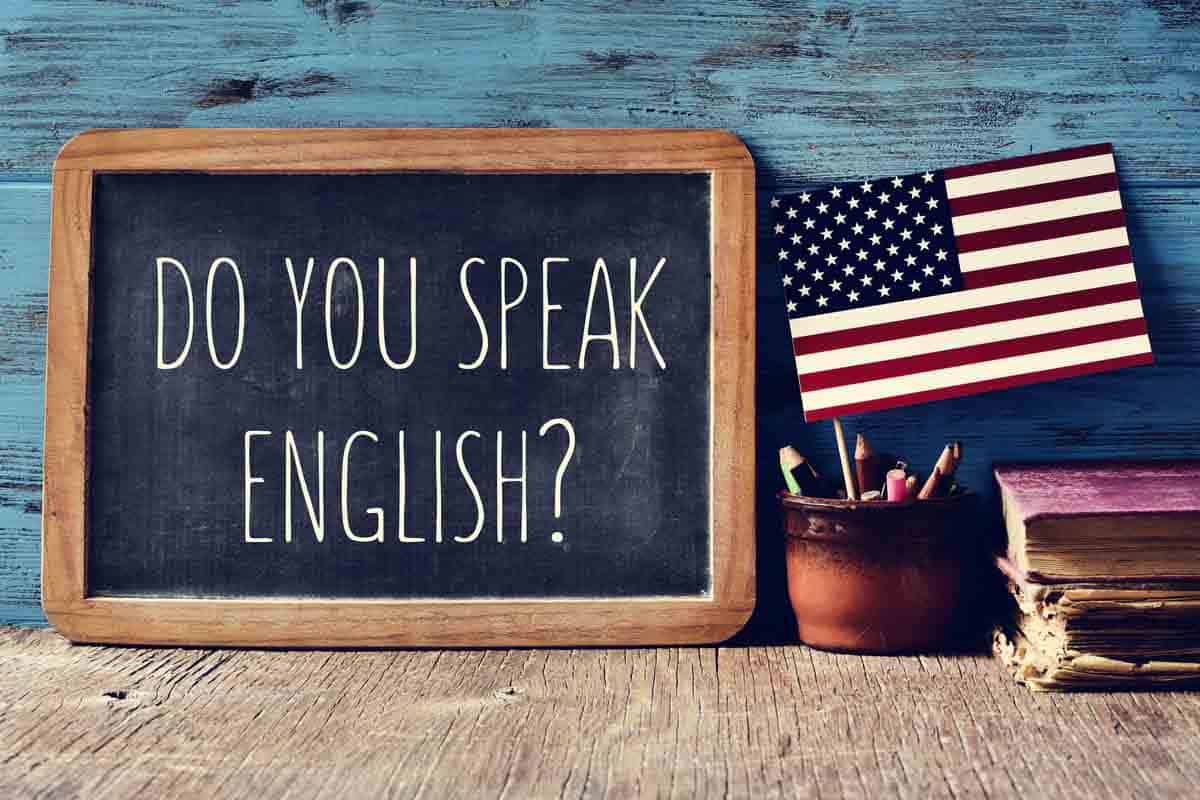
1. Do You Speak English?
This is number one on the list of phrases to know in the local language. If you know nothing else in the local language before heading off to your destination, at least know this handy phrase.
When English speakers start a conversation in the local language using this phrase — rather than automatically jumping into a conversation in English — it goes a long way in gaining the respect and help of a local resident.
- If the person you are speaking to is fluent in English, she will respect that you went to the trouble to learn this phrase in her mother tongue.
- If the local has just a basic understanding of English, asking this question in his language will give him the confidence to give his rudimentary skills a try.
- And if the person doesn’t speak English at all, she will at least understand your native language and can use that information to find someone who does.
Build on this important phrase with related expressions like:
- Could you repeat that?
- More slowly, please.
- I don’t understand.
Related Article: 100 Things Every American Should Know Before Visiting Europe for the First Time
Although English is widely spoken around the world, knowing a few basic phrases in the local language when you travel will enhance your experience. Here are ten common phrases to know in the local language when you travel abroad.
I’ve read that the ideal time to learn a second language is between the ages of three and seven. Lucky for me, my family lived in Germany when I was that age, and my parents seized every opportunity to travel throughout Europe during those years. Plus also, my mother is a teacher.
While I didn’t formally study a European language at my American school, I was regularly exposed to German, French, Dutch, and other European languages as we camped our way through Bavaria, explored France, and ate our way through the Netherlands. I also had the chance to watch Sesamstraße (Sesame Street in German) and expand my budding reading skills by being exposed to signs, menus, and more in multiple languages. I loved soaking up these languages, especially at night when I hauled my favorite book to bed.

Incorporated into his elaborate, themed scenes are words and phrases in German, English, and French. By pouring over the pages each night, I was able to teach myself quite an assortment of words and phrases in three of the most commonly spoken languages in Western Europe.
Had my family remained in the US, I would have likely not been exposed to a foreign language until high school. Sure, there would have been the snippets of dialect heard when visiting my grandparents in the tight-knit, German Catholic community where my parents were raised. But nothing much beyond that.

With the establishment of the European Union in 1993, English has only become even more commonly spoken across Europe over the past few decades since I lived there as a child. While this makes it easier than ever before for Americans traveling the continent to communicate with others, there are tremendous benefits to knowing even just a few words and key phrases in the local language. Not only will knowing these phrases in the local language expand your skills, it will also enrich your travel experiences and help you earn the respect of the locals.
Sage Advice: The longer you plan to spend in a country, the more phrases you should know in the local language.
While you’re likely older than seven, and therefore outside the ideal window for learning a foreign language, you can still do it! And you’ll find that knowing even a few essential phrases in the local language will profoundly enrichen your travel experiences.
To help offset the costs of running EverydayWanderer.com, you’ll find affiliate links lightly sprinkled throughout the site. If you choose to make a purchase via one of these links, there’s no additional cost to you, but I’ll earn a teeny tiny commission. You can read all of the legal blah blah blah (as my little niece says) on the full disclosure page.

1. Do You Speak English?
This is number one on the list of phrases to know in the local language. If you know nothing else in the local language before heading off to your destination, at least know this handy phrase.
When English speakers start a conversation in the local language using this phrase — rather than automatically jumping into a conversation in English — it goes a long way in gaining the respect and help of a local resident.
- If the person you are speaking to is fluent in English, she will respect that you went to the trouble to learn this phrase in her mother tongue.
- If the local has just a basic understanding of English, asking this question in his language will give him the confidence to give his rudimentary skills a try.
- And if the person doesn’t speak English at all, she will at least understand your native language and can use that information to find someone who does.
Build on this important phrase with related expressions like:
- Could you repeat that?
- More slowly, please.
- I don’t understand.
Related Article: 100 Things Every American Should Know Before Visiting Europe for the First Time
2. How to Respond
Because non-verbal language can vary by country and culture, you should not assume that a nod means yes or that a thumbs up is good. Without getting into a lot of details — after all, my mother reads this blog — please know that these gestures can translate into very vulgar and rude alternatives elsewhere around the globe. With very little effort you can (and should) master yes and no as phrases to know in the local language.

- A little bit — Do you want more coffee? A little bit.
- Maybe — Do you want to visit the castle tomorrow? Maybe.

3. Greetings
If you’ve made it this far, add basic greetings to your list of phrases to know in the local language. These include hello, good morning, goodbye, and good night.
Sage Advice: Not sure how to learn this list of phrases to know in the local language? Some of my favorite tools are Duolingo, Babbel, and Rosetta Stone. Duolingo is a free language app that front loads its educational experience with these necessary words and phrases. While Babbel and Rosetta Stone both charge a monthly subscription, they are still affordable (and extremely effective) ways to learn a new language.
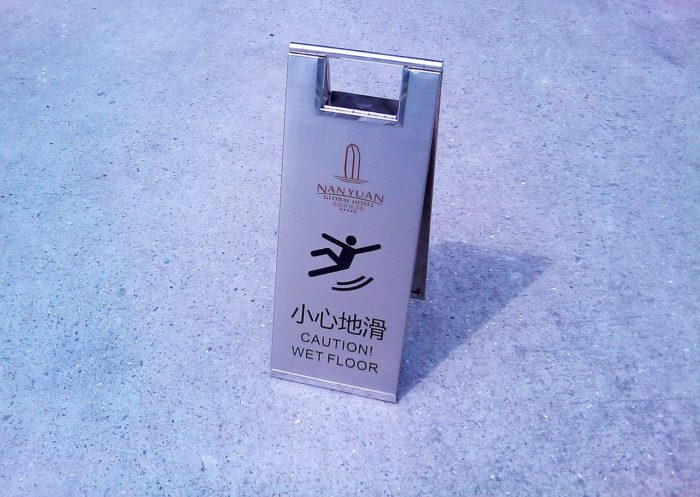
4. Words of Warning
From caution to no smoking, from stay off of the grass to keep out, knowing words of warning are good phrases to know in the local language when you travel abroad. While it might be difficult to know all of the possible combinations, knowing the word for warning or caution can keep you from being injured. Knowing the word for no (see tip #2) or stop can keep you from being fined or possibly arrested.
5. Basic Courtesies
Please and thank you are wise phrases to know in the local language when you travel abroad.
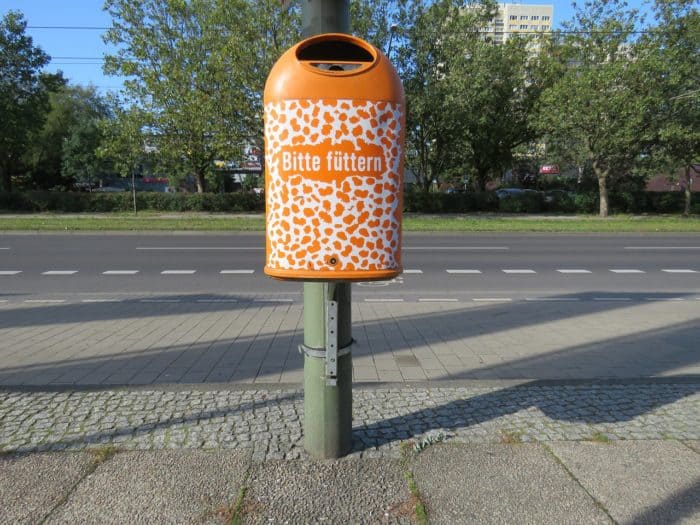
Beyond please and thank you, basic courtesies include phrases like pardon me and I’m sorry.
Why?
Because before asking someone the number one item on this list of phrases to know in the local language, it’s nice to be able to first say, “Pardon me” to get their attention and initiate a conversation. Or when you turn and unintentionally bump someone with your backpack, you can say, “I’m sorry!”
You can also build on the hello you learned in tip #3 by adding, “How are you?”

6. The Numbers Up to Ten
While you can always use your fingers as back up, knowing the numbers up to ten are important to know in the local language.
Sage Advice: While Americans typically indicate the number one with their pointer finger, Europeans typically indicate the number one with their thumb. While Americans typically indicate the number two in a peace sign-like fashion, Europeans typically indicate the number two with an “l” sign.
7. Where is the _________?
If you’re exploring a new destination, chances are you may need help finding things. Therefore, “Where is the _______” is one the phrases to know in the local language.
Fill in the blank with the aid of Google Translate, a pocket dictionary, or by expanding your language skills to include words like:
- nearest doctor
- hospital
- train station
- US embassy
- restroom
- police station
- bank
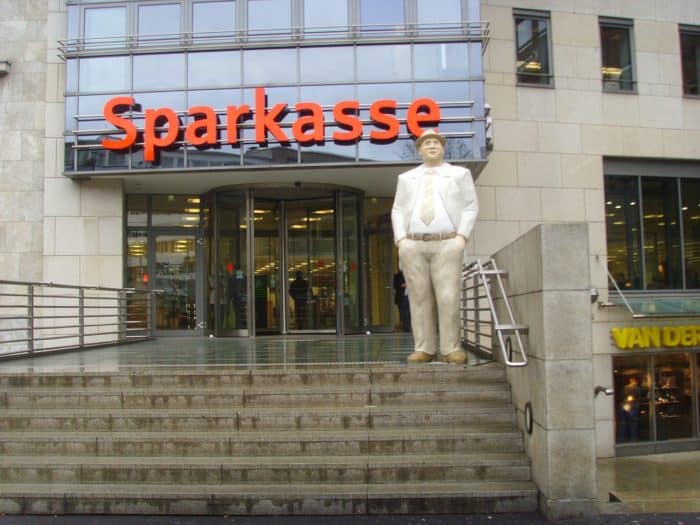
When I was at business breakfast in Berlin with several colleagues, I had the responsibility of picking up the tab. While the five of us spoke six languages among us, none of us spoke German. We successfully ordered our meals and enjoyed the delicious food, but when it was time for me to pay, the waitress told me that they couldn’t accept my company credit card. Only cash. I left my colleagues at the table and ventured out to find a cash machine.
“Sprechen Sie English?” (Do you speak English?) I asked the first person I met on the street as I tried to locate the nearest cash machine in a foreign city.
“Nein” (no) was his reply.
Darn it!
So I continued in very rudimentary German, “Wo ist ein Bankautomat bitte?” (Where is the nearest cash machine, please?) I held my breath and crossed my fingers that I could make sense of his response knowing that I wouldn’t understand much more than the words right and left in German.
To my surprise, he answered in excellent English, “Go to the next corner and turn right. A Sparkasse (the largest network of automatic cash machines in Germany) is just another block down on the right.”
Whew!
Enjoying This Article?
Sign up for the newsletter!
Thank You for Subscribing!

8. How much is ________?
As you explore your exciting new surroundings, you’ll likely want to order bitterballen in the Netherlands or a souvenir in Spain. This is one of the phrases to know in the local language because paired with a pointing finger, it will take you far.
9. I would like ________?
From requesting an English menu at the beginning of your meal to the check at the end, this is another of the phrases to know in the local language.
Sage Advice: If you order water in Europe, you’ll often be asked if you’d like it with or without gas. Without gas is the water Americans typically drink, and with gas is sparkling water which is quite common in Europe.

Fill in the blank with things like:
- an English menu
- water
- coffee
- bread
- wine
- the check, please
Or any other words you’ve picked up along the way or been spoon-fed by Google Translate.
10. Any Dietary Restrictions
If you are traveling with a food allergy or dietary restriction, it’s critical to know how to communicate this in the local language. For travelers with dietary restrictions — like vegetarians and vegans — it’s relatively easy to learn these individual words in the local language and get by with ease.
But if you are traveling with a food allergy, especially a serious allergy that might land you in the emergency room, I recommend backing up your language lessons with a chef card that details your allergies in writing (in the local language of course). When visiting restaurants, bistros, and cafes abroad, you can simply hand the chef card to your server and easily communicate your allergies.
Because I now travel with a recently diagnosed food allergy, I find a native speaker to translate my dietary restrictions into the local language before I leave home. And when I travel abroad, I keep a copy with me at all times — printed on paper, digitally on my phone, etc — so I never have issues.
If you are unable to find a native speaker to help you translate your dietary restrictions into the local language, you can also purchase a pre-translated card for your food allergy. They are typically available in several dozen languages for a wide range of food allergies.
What Phrases Do You Think Are Important to Know in the Local Language?
Has knowing travel expressions and other phrases in the local language enhanced your travels? Are there other phrases to know in the local language that you’d add to the list? Share your thoughts in the comments section below.
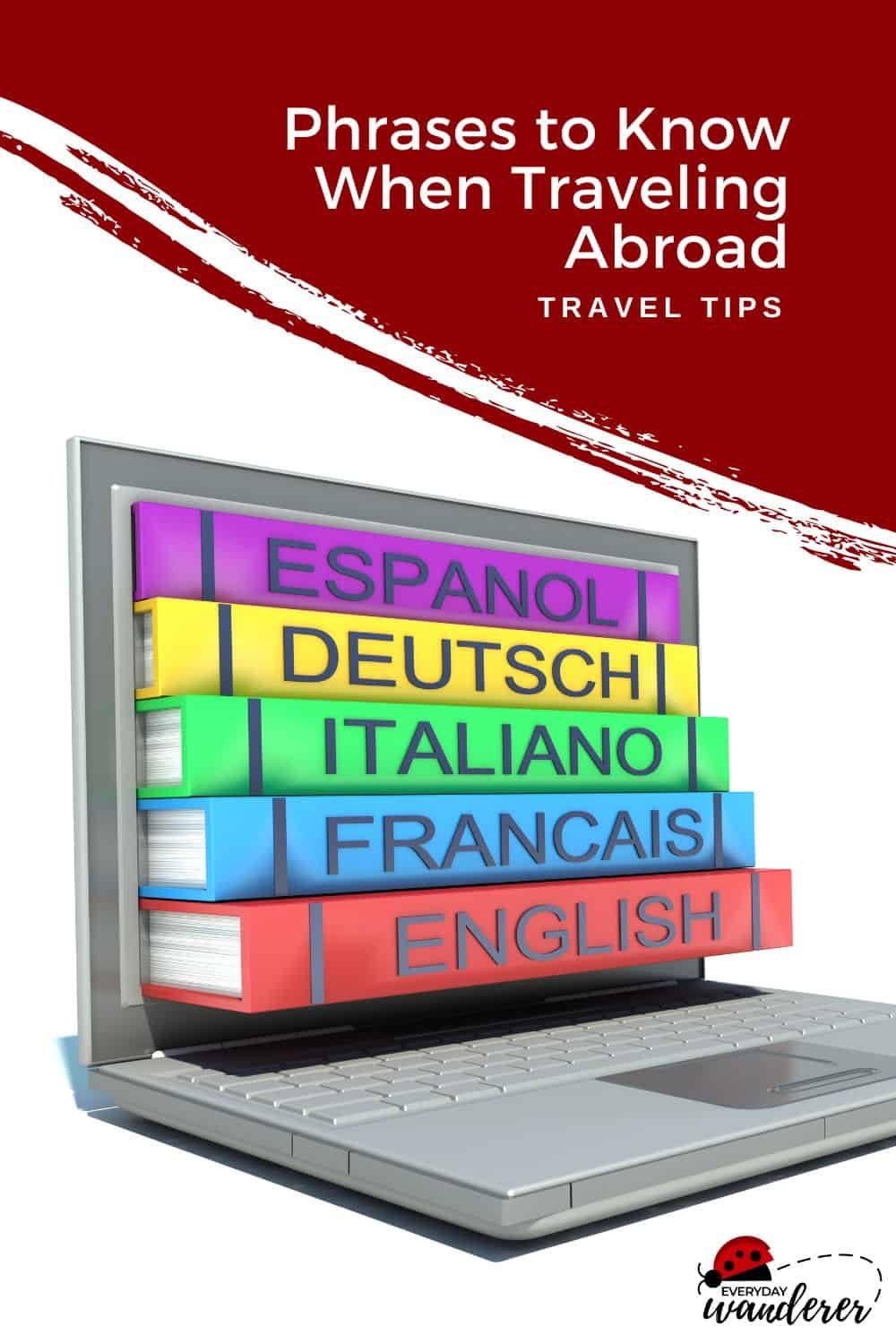
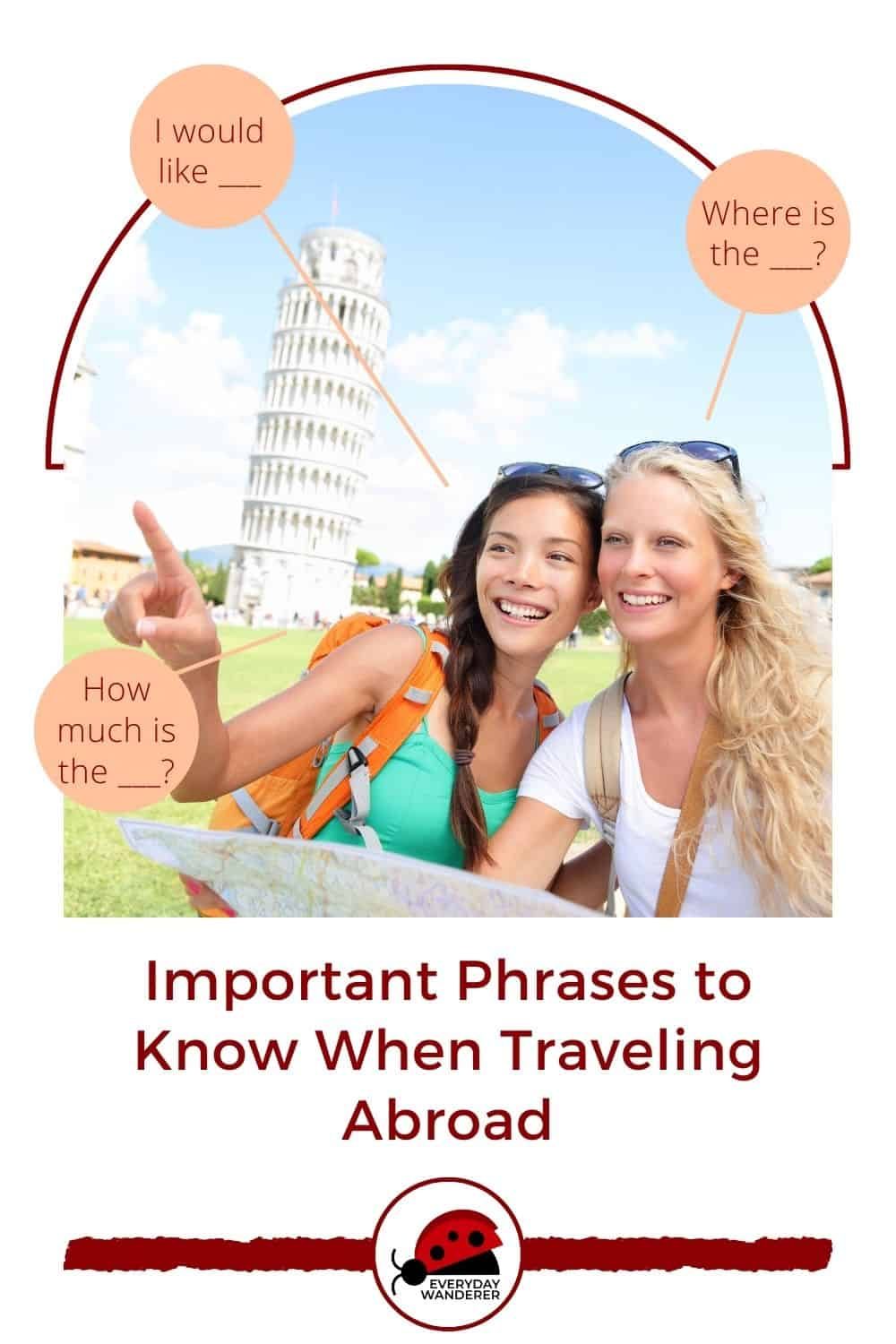

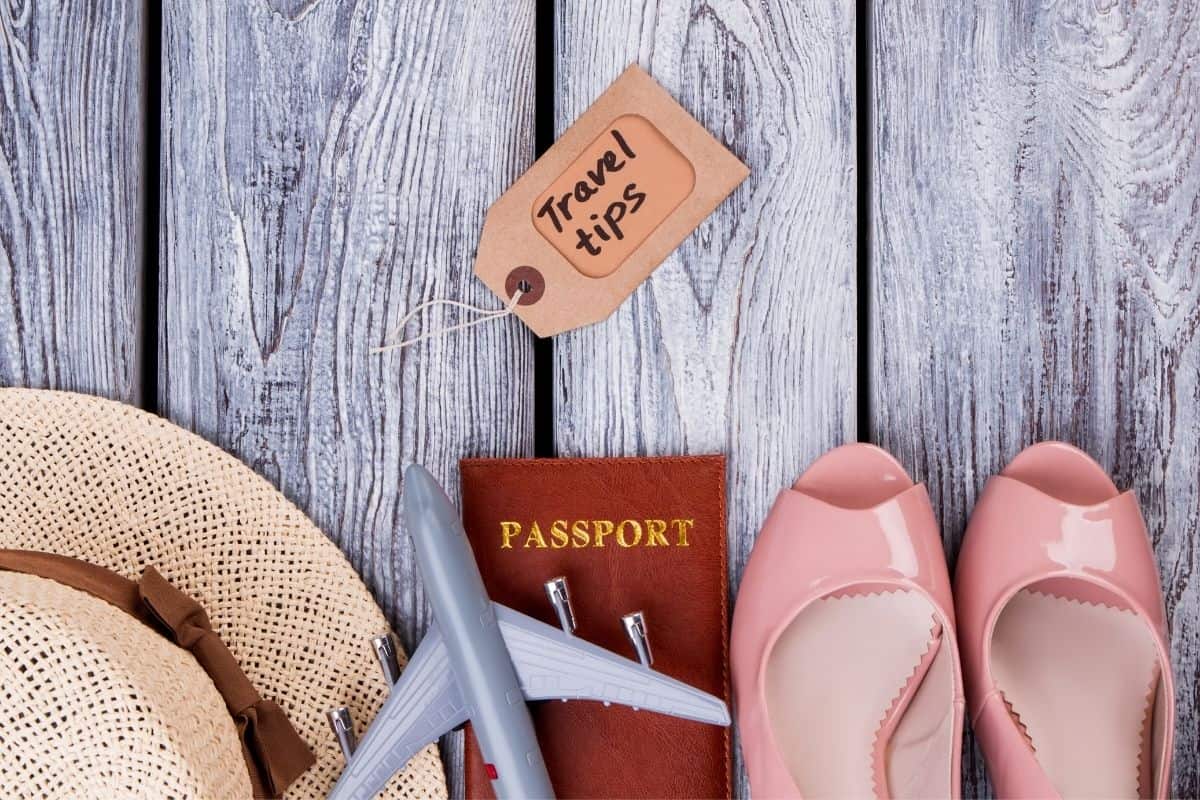
Looking for more helpful travel tips? Everyday Wanderer is packed with all sorts of additional travel planning tips including everything an American needs to know before visiting Europe for the first time, how to adjust to higher altitudes, easy ways to avoid getting sick while traveling, and more!
Ready to Go?
Use These Helpful Links to Book Your Trip!
- Find low fares with airfarewatchdog and Skyscanner
- Book your plane ticket with Expedia or Kayak
- Or take the scenic route on an epic road trip in a rental car or an RV from Outdoorsy
- From hotels to private homes, find the perfect accommodation with Hotels.com or Vrbo
- Travel in style with a suitcase, carry-on, backpack, or handbag from eBags
- Save on tickets to attractions, sightseeing tours, and more with CityPASS, Tiqets, and Viator
- Don’t leave home without travel insurance from AXA
- Discover the sights, history, and culture of your destination with an interactive scavenger hunt
- Need something else to plan your perfect trip? Visit my travel resources page for more trusted partners. Happy wandering!
2. How to Respond
Because non-verbal language can vary by country and culture, you should not assume that a nod means yes or that a thumbs up is good. Without getting into a lot of details — after all, my mother reads this blog — please know that these gestures can translate into very vulgar and rude alternatives elsewhere around the globe. With very little effort you can (and should) master yes and no as phrases to know in the local language.

- A little bit — Do you want more coffee? A little bit.
- Maybe — Do you want to visit the castle tomorrow? Maybe.

3. Greetings
If you’ve made it this far, add basic greetings to your list of phrases to know in the local language. These include hello, good morning, goodbye, and good night.
Sage Advice: Not sure how to learn this list of phrases to know in the local language? Some of my favorite tools are Duolingo, Babbel, and Rosetta Stone. Duolingo is a free language app that front loads its educational experience with these necessary words and phrases. While Babbel and Rosetta Stone both charge a monthly subscription, they are still affordable (and extremely effective) ways to learn a new language.

4. Words of Warning
From caution to no smoking, from stay off of the grass to keep out, knowing words of warning are good phrases to know in the local language when you travel abroad. While it might be difficult to know all of the possible combinations, knowing the word for warning or caution can keep you from being injured. Knowing the word for no (see tip #2) or stop can keep you from being fined or possibly arrested.
5. Basic Courtesies
Please and thank you are wise phrases to know in the local language when you travel abroad.

Beyond please and thank you, basic courtesies include phrases like pardon me and I’m sorry.
Why?
Because before asking someone the number one item on this list of phrases to know in the local language, it’s nice to be able to first say, “Pardon me” to get their attention and initiate a conversation. Or when you turn and unintentionally bump someone with your backpack, you can say, “I’m sorry!”
You can also build on the hello you learned in tip #3 by adding, “How are you?”

6. The Numbers Up to Ten
While you can always use your fingers as back up, knowing the numbers up to ten are important to know in the local language.
Sage Advice: While Americans typically indicate the number one with their pointer finger, Europeans typically indicate the number one with their thumb. While Americans typically indicate the number two in a peace sign-like fashion, Europeans typically indicate the number two with an “l” sign.
7. Where is the _________?
If you’re exploring a new destination, chances are you may need help finding things. Therefore, “Where is the _______” is one the phrases to know in the local language.
Fill in the blank with the aid of Google Translate, a pocket dictionary, or by expanding your language skills to include words like:
- nearest doctor
- hospital
- train station
- US embassy
- restroom
- police station
- bank

When I was at business breakfast in Berlin with several colleagues, I had the responsibility of picking up the tab. While the five of us spoke six languages among us, none of us spoke German. We successfully ordered our meals and enjoyed the delicious food, but when it was time for me to pay, the waitress told me that they couldn’t accept my company credit card. Only cash. I left my colleagues at the table and ventured out to find a cash machine.
“Sprechen Sie English?” (Do you speak English?) I asked the first person I met on the street as I tried to locate the nearest cash machine in a foreign city.
“Nein” (no) was his reply.
Darn it!
So I continued in very rudimentary German, “Wo ist ein Bankautomat bitte?” (Where is the nearest cash machine, please?) I held my breath and crossed my fingers that I could make sense of his response knowing that I wouldn’t understand much more than the words right and left in German.
To my surprise, he answered in excellent English, “Go to the next corner and turn right. A Sparkasse (the largest network of automatic cash machines in Germany) is just another block down on the right.”
Whew!
Enjoying This Article?
Sign up for the newsletter!
Thank You for Subscribing!

8. How much is ________?
As you explore your exciting new surroundings, you’ll likely want to order bitterballen in the Netherlands or a souvenir in Spain. This is one of the phrases to know in the local language because paired with a pointing finger, it will take you far.
9. I would like ________?
From requesting an English menu at the beginning of your meal to the check at the end, this is another of the phrases to know in the local language.
Sage Advice: If you order water in Europe, you’ll often be asked if you’d like it with or without gas. Without gas is the water Americans typically drink, and with gas is sparkling water which is quite common in Europe.

Fill in the blank with things like:
- an English menu
- water
- coffee
- bread
- wine
- the check, please
Or any other words you’ve picked up along the way or been spoon-fed by Google Translate.
10. Any Dietary Restrictions
If you are traveling with a food allergy or dietary restriction, it’s critical to know how to communicate this in the local language. For travelers with dietary restrictions — like vegetarians and vegans — it’s relatively easy to learn these individual words in the local language and get by with ease.
But if you are traveling with a food allergy, especially a serious allergy that might land you in the emergency room, I recommend backing up your language lessons with a chef card that details your allergies in writing (in the local language of course). When visiting restaurants, bistros, and cafes abroad, you can simply hand the chef card to your server and easily communicate your allergies.
Because I now travel with a recently diagnosed food allergy, I find a native speaker to translate my dietary restrictions into the local language before I leave home. And when I travel abroad, I keep a copy with me at all times — printed on paper, digitally on my phone, etc — so I never have issues.
If you are unable to find a native speaker to help you translate your dietary restrictions into the local language, you can also purchase a pre-translated card for your food allergy. They are typically available in several dozen languages for a wide range of food allergies.
What Phrases Do You Think Are Important to Know in the Local Language?
Has knowing travel expressions and other phrases in the local language enhanced your travels? Are there other phrases to know in the local language that you’d add to the list? Share your thoughts in the comments section below.

Looking for more helpful travel tips? Everyday Wanderer is packed with all sorts of additional travel planning tips including everything an American needs to know before visiting Europe for the first time, how to adjust to higher altitudes, easy ways to avoid getting sick while traveling, and more!
Ready to Go?
Use These Helpful Links to Book Your Trip!
- Find low fares with airfarewatchdog and Skyscanner
- Book your plane ticket with Expedia or Kayak
- Or take the scenic route on an epic road trip in a rental car or an RV from Outdoorsy
- From hotels to private homes, find the perfect accommodation with Hotels.com or Vrbo
- Travel in style with a suitcase, carry-on, backpack, or handbag from eBags
- Save on tickets to attractions, sightseeing tours, and more with CityPASS, Tiqets, and Viator
- Don’t leave home without travel insurance from AXA
- Discover the sights, history, and culture of your destination with an interactive scavenger hunt
- Need something else to plan your perfect trip? Visit my travel resources page for more trusted partners. Happy wandering!
Thank you for sharing!



These are excellent tips that sometimes slip people’s minds when they travel. Knowing a few words and essentials like how to count and ask if someone even speaks English is so important. I also find that asking people if they speak English before just bombarding them with questions always gets a much better response. Especially in places like Paris!
Ah, yes, ESPECIALLY in Paris! 🙂
This is great advice, even a few words in the local language really changes how the local people treat you – a hello, please & thankyou goes a long way! Speaking Spanish really made my trip to Latin America much better as I could chat with locals and learn more about the culture.
I think this is a great post for travellers. I speak English, Spanish, and learning Italian, so I agree with your tips and advice. The longer you spend in a country, the more you pick up the language. Learning how to ask ‘where is’ and ‘how much’ are really useful questions that will come up during any travels!
Your advice is very welcome. I am part of that group that has never tried to learn new words/phrases in a language. Or at least, I never learn them from home. Even if people don’t speak English, I found out that the body language or signs are more useful. You know that our communication skills reside first in body language, then the way/tone/ voice we say it, and just at the end the words we use. I’ve been widely using Google Translate if necessary, but the communication was lacking exactly the body language. A combination of all of these would be ideal, though.